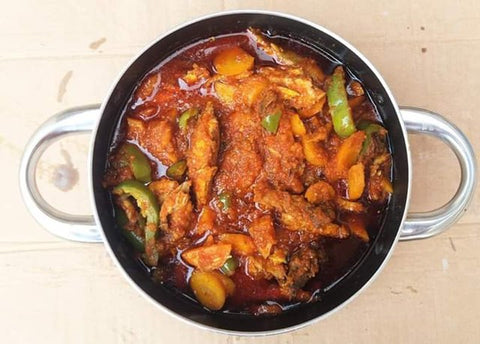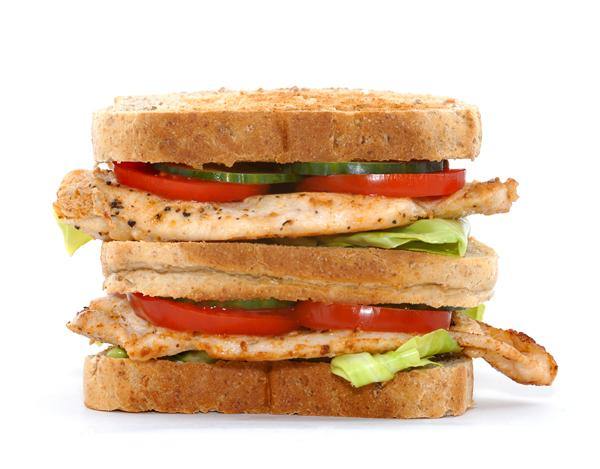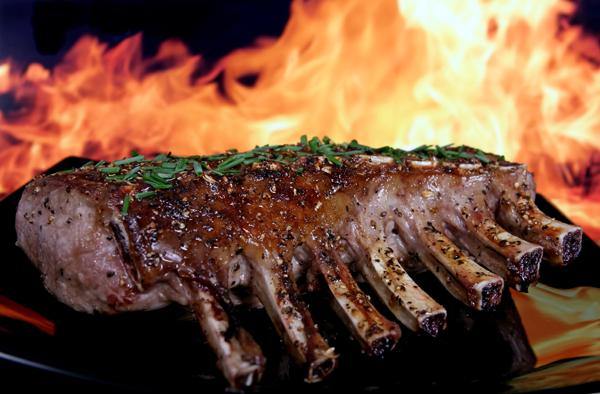A Ragout of Beef
Miss Bingley was engrossed by Mr Darcy, her sister scarcely less so; and as for Mr Hurst, by whom Elizabeth sat, he was an indolent man, who lived only to eat, drink, and play at cards, who, when he found her prefer a plain dish to a ragout, had nothing to say to her.
Pride and PrejudiceBy Georgian times, Roast Beef* had become the staple of the Englishman's diet. The subject of song and legend, this particular dish was credited with everything from Englishmen's courage and stout hearts to their victories over France. A traveler of the 1700's observed:

During the Regency, however, British cooking had changed. French recipes became the rage. Indeed, Mrs. Bennet supposed Mr. Darcy to keep "...two or three French cooks at least." With this change came a desire for more "exotic" dishes. Fricassees and Ragoo (ragout) began to appear on English tables. Though merely stewed meat and vegetables, they were certainly a change from the boiled or roasted beef that had been the meal of choice for over 1,000 years. Still, though it shows a bit of country naivety on her part, who can blame poor Elizabeth Bennet, who, when put on the spot by Mr. Hurst, admits to preferring the food of her youth-- a "plain dish", to all these strange new recipes. She may not be on the the cutting edge of society's gastronomic delights, but then again, isn't this same innocent lack of pretension the reason Mr. Darcy-- and readers of the last 200 years have fallen in love with her?
Beef and Roasted Vegetable Ragout
- The Vegetables:
- olive oil
- 2 to 3 medium red potatoes, peeled if desired, cut in 1/2-inch dice
- 2 small carrots, quartered lengthwise and cut in 1-inch slices
- 1 small turnip, cut in 1/2-inch dice
- 1 red bell pepper or a combination of red, yellow, orange, cut in 1-inch pieces
- 3 small zucchini and/or yellow summer squash, sliced about 1/4-inch (remove seeds if larger squash are used)
- 8 ounces mushrooms, sliced
- 1 fresh pepper, seeded and cut in 1/2-inch pieces (optional)
- 3 cloves garlic, unpeeled
- coarsely ground black pepper and kosher salt, to taste
- 1 teaspoon dried thyme
- dash of fines herbs (optional)
- sprig of fresh rosemary (optional)
- The Beef:
- olive oil
- 1 1/2 to 2 lbs London Broil steak, cut in thin slices then diced in 1/2-inch pieces
- 1 bunch scallions, sliced
- 3 tablespoons all-purpose flour
- 1 cup beef broth (if commercial is used, cut back on salt)
- coarsely ground pepper and kosher salt, to taste
- 1 small bay leaf, fresh, or two dry bay leaves
Divide sliced and diced vegetables into 2 plastic bags. In one, the root vegetables: potatoes, turnip, and carrots. Put the remaining vegetables in the other bag. Pour 1 to 2 tablespoons of good olive oil in each bag, then divide seasonings to each bag. Shake them all. Place the root vegetables on a large baking sheet (with sides) or wide baking dish. Bake at 375 ° for about 20 minutes before adding the remaining vegetables. Roast another 20 minutes, or until vegetables are browned and tender. Find the 3 garlic cloves and squeeze the garlic out of the skins; refrigerate the roasted vegetables. This can be done the night before. In a large skillet, heat about 1 1/2 tablespoons olive oil over medium high heat.
Add the diced meat; stir until well browned. Sprinkle with scallions and flour; stir and cook for another minute. Transfer meat mixture to the crockpot; add bay leaf, pepper, and salt. Add beef broth to the pan the meat was cooked in; bring to a boil and cook for 2 minutes. Scrape up browned bits from the bottom of the pan; pour hot broth over meat in the crockpot. Cover and cook on low for 6 to 8 hours. Add roasted vegetables; cook an additional hour on high, or until mixture is hot. Serve with hot rolls or biscuits.
*For a full history of Britain's Beef, visit Jim Comer's fascinating page.
Enjoyed this article? If you don't want to miss a beat when it comes to Jane Austen, make sure you are signed up to the Jane Austen newsletter for exclusive updates and discounts from our Online Gift Shop.



Leave a comment
This site is protected by hCaptcha and the hCaptcha Privacy Policy and Terms of Service apply.